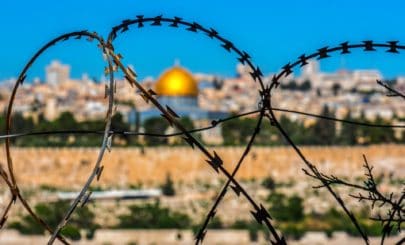
Hatred stirs up strife, but love covers all offenses. Proverbs 10:12
January 20, 2017 was an immense day of change for our country. For me, it carried additional significance, as it was also the day I returned from my first trip to the Holy Land. While experiencing the change of administration in our country, I am also processing a trip that changed my life. As I traveled in the land that Judaism, Christianity and Islam all claim holy, I had incredible opportunities. I visited various holy sites and learned more about the complexities of the Israeli/Palestinian conflict. My fellow seminarians and I also met with NGO’s and leaders committed to seeking peace.
As we sat on buses and listened to our guides share their wisdom, a common theme ran throughout the course of the trip. We heard about it as we met with peace organizations in Israel and the West Bank. We were reminded of this theme as we talked with each other about the things we had seen and encountered. The thread that brings Palestinians and Israelis, Muslims and Jews, and everyone else engaged in the peace movement together is the consistent desire to know “the other”—the person from the other community, the other religion, or the other culture. Due to complex factors, the situation in Israel/Palestine creates insular communities who often do not interact with one another. The outcome is an “othering” of people outside of one’s community, causing fear and misunderstanding that can result in violence.
One organization, Parents’ Circle: A Forum of Bereaved Palestinian and Israeli Families for Peace and Reconciliation, does incredible work resisting this phenomenon of “othering.” Parents’ Circle consists of both Israelis and Palestinians who have lost loved ones due to the conflict. Their grief, while heartbreaking and seemingly unbearable, has brought them together in an unexpected way. On our last morning in Israel, our group of tired and overwhelmed seminary students gathered in a room overlooking Bethlehem to hear the personal stories of Rami, an Israeli man, and Bassem, a Palestinian man, both of whom lost their daughters as a result of violence due to the conflict. These men have every reason to villainize each other, yet through their shared grief, they discovered their shared humanity. Rami said in the beginning of our time together that Bassem was one of his closest friends, and that he loves him dearly because he understands his grief in a way that no other can.
These men have every reason to villainize each other, yet through their shared grief, they discovered their shared humanity.
Proverbs 10:12 reminds us that “hatred stirs up strife, but love covers all offenses.” We cannot love each other without knowing each other, and loving each other paves the way to reconciliation and peace. While the wounds of losing a loved one never seem to fully heal, the shared love between these two men created a kind of soothing balm and allows them to work together for peace in their land.
Dear God,
We thank you for Parents’ Circle and the work they do. Thank you for the ways they bring people, who have every reason to hate each other, together in love. Throughout Scripture, you tell us to love “the other.” Yet, how often do we even know “the other?” Lord, help us not to perpetuate the “othering” of people in our communities, both locally and globally. Instead, bring us together, just as Parents’ Circle does, so that we might be reconciled to one another in love.
In the Name of Christ Jesus,
Amen
Molly Lorden is the Church Engagement & Millennial Voices for Peace Intern at Churches for Middle East Peace, and is studying toward a Masters in Divinity from Princeton Theological Seminary. She writes for Prayers for the Holy Land, where this article first appeared.



One Response
Thank you for this article it is a worthwhile read and a reminder as to how love can bring us together!